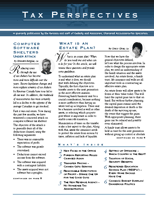
PDF Format
 Issue Contents Issue Contents
 All Issues All Issues
October 1997
Foreign Reporting Rules Changed Again
Canada's foreign reporting rules were passed into law in April 1997. However, before the forms were even released, the rules have changed yet again. The most significant points are summarized below. Personal Reporting Deferred
The information return for foreign investment assets has been postponed to next year, pending study. Quite possibly it will never re-emerge.
This rule sparked the greatest controversy, because it would have applied to such a wide range of people and investments. The other information reporting rules will come into effect. Extension of first filing deadline
The due date for other information returns that were to be filed on April 30, 1997 (to report transfers or loans to non-resident trusts, and distributions from non-resident trusts) have been extended by one year to April 30, 1998. The deadline for filing information returns for foreign affiliates (a foreign corporation in which you and related people own 10% or more) has been extended to June 30, 1998. Although the deadline has been extended, the reporting will still apply to the 1996 year as originally proposed. Thus the 1996 and 1997 forms will both be due at the same time, April 30 or June 30, 1998. Exception for first year residents
Individuals will be exempt from the foreign reporting requirements for the year in which they first become Canadian residents. Penalties Still Heavy
Where the failure to file an information return is deliberate or the circumstances constitute gross negligence, the penalty in most situations will now be $500 per month, for up to 24 months ($12,000 maximum) plus 5% of the cost of certain foreign property where the failure to file exceeds two years. A much reduced penalty will apply for inadvertent errors: $25 per day to a maximum of $2,500. Due diligence exception
Where a taxpayer can show that due diligence was exercised in attempting to obtain the required information, penalties for omissions will not apply. The government has recognized that some taxpayers will not be able to obtain all the required information from foreign affiliates and non-resident trusts, especially where they exert minimal influence. Fortunately, the rules will now apply in more limited situations, and not to the public at large. But if you are unsure of how the rules may affect you, don't wait until the last minute. Get professional assistance now.
|